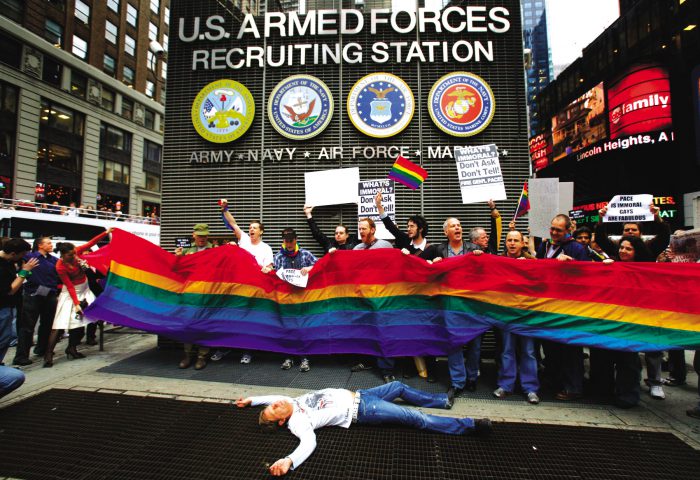In the first hearing about the “Don’t Ask, Don’t Tell” policy since it was enacted by President Bill Clinton in 1993, a House committee heard testimony on July 23 from opponents and supporters of the military code that prohibits gay men and women who serve from openly expressing their sexual orientation. The hearing is part of an effort to jumpstart talk about repealing the law that bans gays and lesbians from serving openly in the military.
“We want to start a conversation,” Representative Susan Davis, the California Democrat who chairs the House Military Personnel Subcommittee that held the hearing, stated in USA Today.
A declining number of military enlistees, and the pending presidential election make reform of the policy, which over the past 15 years has removed more than 12,000 servicemembers from active duty, an agenda item this season. Senator Barack Obama, the presumptive Democratic nominee, has said that if elected president, he would repeal the ban. Senator John McCain, the presumptive Republican nominee, has said that he wants no change.
A recent Washington Post-ABC News poll found that 75 percent of respondents said openly gay people should be allowed to serve in the military, compared to 44 percent who responded that way in 1993.
Congresswoman Ellen Tauscher (D-CA) sponsors a bill to overturn the policy that currently has 133 co-sponsors. However, key Democratic leaders, such as House Armed Services Committee Chairman Ike Skelton of Missouri, support the policy, and there are no plans to bring the bill to a vote this year.
The Pentagon sent no officials to the hearing. Five witnesses, including two openly gay former servicemembers, testified.
The hearing took place one month after Servicemembers Legal Defense Network released new data showing that the “Don’t Ask, Don’t Tell” policy affects women disproportionately. While women make up approximately 15 percent of the armed forces, SLDN found, they account for nearly half of all the policy’s discharges from the Army and Air Force.
Discharges of women from the Army rose significantly in Fiscal Year (FY) 2007 compared to the previous year. In FY 2007 women accounted for 14 percent of the Army’s active duty force while making up 46 percent of discharges, compared to FY 2006 when women represented 17 percent of the Army and made up 35 percent of DADT discharges.
In FY 2007 overall, at least 627 military personnel were dismissed under the “Don’t Ask, Don’t Tell” ban on openly gay service members, up from 612 in FY 2006.
Since the ban began, women have been affected disproportionately. Commonly, a male subordinate may attempt to out a female superior, whether or not she really is a lesbian, as a form of retribution for a perceived grievance on the job.


What Do You Think?